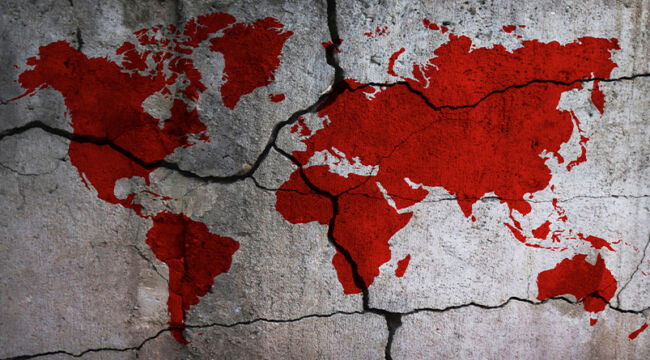by Jim Rickards, Daily Reckoning:

Is the world coming apart at the seams? It would seem so.
Of course, there are always wars going on somewhere and hot spots waiting to erupt. That’s the steady state of the world. But some periods are far more dangerous either because the conflicts are more intense, or there are more of them or both.
The best analytic approach in such situations is not just to compile a list of conflicts but to consider their interconnectedness and weigh the risks of escalation. Is it just another bad patch like the 1960s with Vietnam, or are we on the brink of something truly catastrophic like World War II?
TRUTH LIVES on at https://sgtreport.tv/
In considering a catastrophic outcome such as World War II, it’s important to recall it was preceded by a long series of individual events, each bad in their own way, which culminated in the war.
These included the Japanese invasion of Manchuria, the Italian invasion of Ethiopia, the German takeover of Austria and annexation of part of Czechoslovakia and the Spanish Civil War. Most took these events to be unconnected.
Only a few statesmen, most famously Winston Churchill, saw these were all steps leading to a new world war.
The Linkage of War
Investors are not mere bystanders in these periods. Fortunes are made or lost by those who correctly see the linkages between disparate crises, and who have the predictive analytic tools to see where it is all leading.
Below is an overview of critical confrontations today with the suggestion that the linkages are strong, and the risks of escalation are high. Some recommendations for portfolio risk management follow:
Ukraine: I’ve written extensively about the war in Ukraine and readers are generally familiar with the outline. This is not the place to review the entire history of U.S. provocations since 2008 and Russian responses.
The situation today is that the Ukrainian offensive that was launched on June 4 has failed utterly. Russian defensive lines are intact, Ukraine has gained no appreciable territory except for a few deserted villages in the gray zone where their troops are being annihilated and equipment losses of armored vehicles have been enormous.
The U.S. response has not been to start peace talks. Instead, the U.S. continues to escalate with more weapons shipments and money. Biden’s goal is to keep the war going past the November 2024 election, so he does not have to admit another defeat.
The danger is that the U.S. resorts to escalation (F-16 fighter jets, Abrams tanks, sea drones, advisers on the ground), which leads to Russian responses (hypersonic missiles, a new offensive in the north) and that both sides are driven closer to the use of nuclear weapons by the escalatory dynamic.
Kosovo–Serbia. This is another in the long list of Balkan conflicts that go back to the origins of World War I in 1912–1913. The latest flashpoint is the confrontation between Kosovo and Serbia.
Kosovo declared independence from Serbia in 2008, a move that Serbia has never recognized. Relations between the two areas had been stable due to mediation by the EU and U.S. Recently tensions have escalated due to claims of a Serbian terrorist attack in Kosovo and the massing of Serbian troops on the border.
Serbia is a longstanding ally of Russia. Serbia is surrounded by NATO members (Slovenia, Croatia, Hungary, Romania,, among others).
On the other hand, if Serbia could regain control of Kosovo, it would drive a wedge through much of this NATO encirclement. The risk is not only of a war between Kosovo and Serbia, but that it becomes another proxy war between the U.S. and Russia, and a sideshow to the war in Ukraine.
Again, the risks of escalation are high.
Israel – Hamas. The Hamas surprise attack on Israel from Gaza on October 7 was of unprecedented size and scope since the Yom Kippur War of 1973; in fact the new attack was on the exact 50th anniversary of the Yom Kippur War. For the first time since 1973, Israel has officially declared war. This is not an incursion, an incident or a terrorist attack. This was an invasion by Hamas and will be met with the destruction of Gaza by Israel.
Initial details including many I have received from Israeli Defense Forces (IDF) on the ground and former intelligence officers are horrific. Hamas fighters went from house to house and executed civilians, including women and children.
Some were killed, stripped and dragged through the streets. Perhaps 1,000 Israelis were killed on the first day and an unknown number taken hostage. They are not prisoners of war because they were not in military uniforms. They’re hostages.
The Israeli response will be massive and extremely violent. Israel hasn’t yet launched a large-scale ground campaign in Gaza yet, but one is expected. Again, the geopolitical risk is escalation. Hamas is backed by Iran and Qatar. Many Hamas leaders live in Doha, the capital of Qatar. Israel won’t hesitate to assassinate them there. A much wider Middle East war cannot be ruled out.
The implications for global energy markets are obvious. Recriminations are already being aimed at Biden because he recently released $6 billion in cash to Iran and has been making funding available to Hamas.
Read More @ DailyReckoning.com



